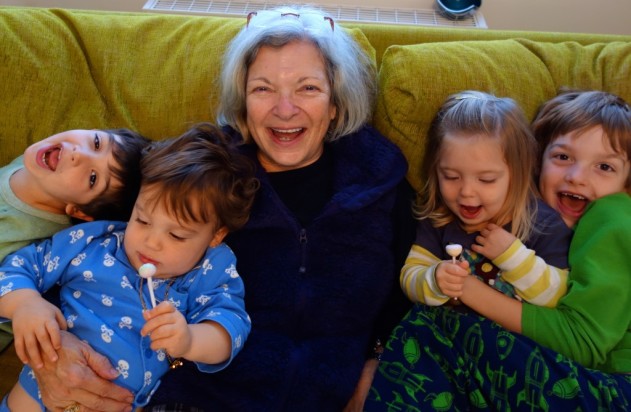“I have my own life,” she reminds me, with perfect kindness and accuracy. “I don’t need to re-live having children through yours.”
My mother recently came to visit me and my family for 10 days. Here is a list of the things she did vis-a-vis my four children:
Played with them.
Gave them snacks and sweets.
Talked to them.
Bought them gifts.
Hugged and kissed them.
And here is a list of the things she didn’t do:
Bathe them.
Dress them.
Prepare or serve any of their meals.
Help them with their homework.
Put them to bed.
Based on these lists, my mom is what you might call a “hands-off” Grandma—or Bubbe, as she is affectionately referred to. She loves her grandkids. She enjoys spending time with them, in small doses. She cares about their well-being and what is happening in their lives. But she is not interested in participating in the grunt work of raising them: the tasks that include bodily fluids and flailing limbs, tears and stall tactics and four outfit changes in as many minutes. In so far as it is possible to engineer, my mother, at 70, is looking to experience the good bits associated with young children, the fun bits, and not the slog.
For her, this is the line between what it is to be a grandparent and what it is to be a parent. This is the privilege you earn with the prefix “Grand.” “I’ve done my time,” she says, and she certainly has. She is the mother of three children, across eight years and two marriages. She did everything for us as we grew up—playdates, parties, projects—everything. She watches some of her friends “grandparent” in a way she finds unappealing, women, she says, who are attempting motherhood all over again. “I have my own life,” she reminds me, with perfect kindness and accuracy. “I don’t need to re-live having children through yours.”
We’d all to like to envisage ourselves, down the road, as the prize-winning Nana: the one who advises without overstepping, who spoils without undermining. The one who serves up just the right stew of helpfulness and detachment. I remember once, during a particularly trying visit with my in-laws amidst the topsy turviness of early parenthood, making a mental list of my own. It was a list of the sort of grandparental services I myself would provide, if I was lucky enough to see the day, and at the top of it was this: When the mother of a newborn baby walks into the kitchen in the morning looking like death warmed over, offer to take said baby and send said mother back to bed. Because, personally, I would trade a hundred meals cooked for an extra hour or two of sleep.
But my kids might want something else entirely from me, when they are parents. They will probably want different things from each other. And as hard as most grandmas try to strike that elusive middle ground of involvement, the reality is that their efforts seem to bunch at the ends of the spectrum. Scan the message boards and you will find, repeatedly, either complaints about grandmothers who are hyper-involved with their grandkids, meddling far beyond the pale and driving the parents themselves batty in the process. Or grievances against the grandmothers who don’t do enough, according to their offspring, who do less than was expected, less than was promised. The selfish grandmas, the grandmas who can’t be bothered.
There are many factors that determine what kind of grandma a mother will in turn become—and the opportunity to become a grandma at all is a great fortune. Desire and personality are a large part of it, but so too are age, employment status, health, and proximity. I wonder what the dynamic would be like if I lived nearer to my mom, less than a plane ride away. Would she babysit for me on a random Tuesday afternoon or would she offer to pay somebody else to do it instead? My mom has often said, and I understand the sentiment, that contributing financially is a way of assuaging her guilt. Her guilt for not being more present, where “present” has multiple meanings.
My mother has been clear about her role as Bubbe from day one—that unlike 72% of her peers, she does not consider being a grandparent the single most important and satisfying aspect of her life. But how involved she will be on a given occasion, how dirty she is willing to get her hands, does vary. Not because her perspective changes, mind you, but because what I need changes. We laughed when my twins were born, my third and fourth children; it was the first time she had changed any of their tiny diapers, it was the first time I had explicitly asked her to. My mom will take the baby, in other words, she will take him so that I can have a break, so that I can go back to sleep.
This trip, she opted out of much of the scut work of childcare and that was fine: The kids are older now, they are in school most of the day, I’m not so run ragged anymore. It was fine, I realized, because the person my mom comes to mother, when she visits, is the person she has always mothered. Me.
Lauren Apfel is a writer and mother of four (including twins). She blogs at omnimom.net and is the debate editor for Brain, Child Magazine. Connect with her on Twitter and Facebook.
This originally appeared on Brain, Child. Republished here with permission.
Related Links:

